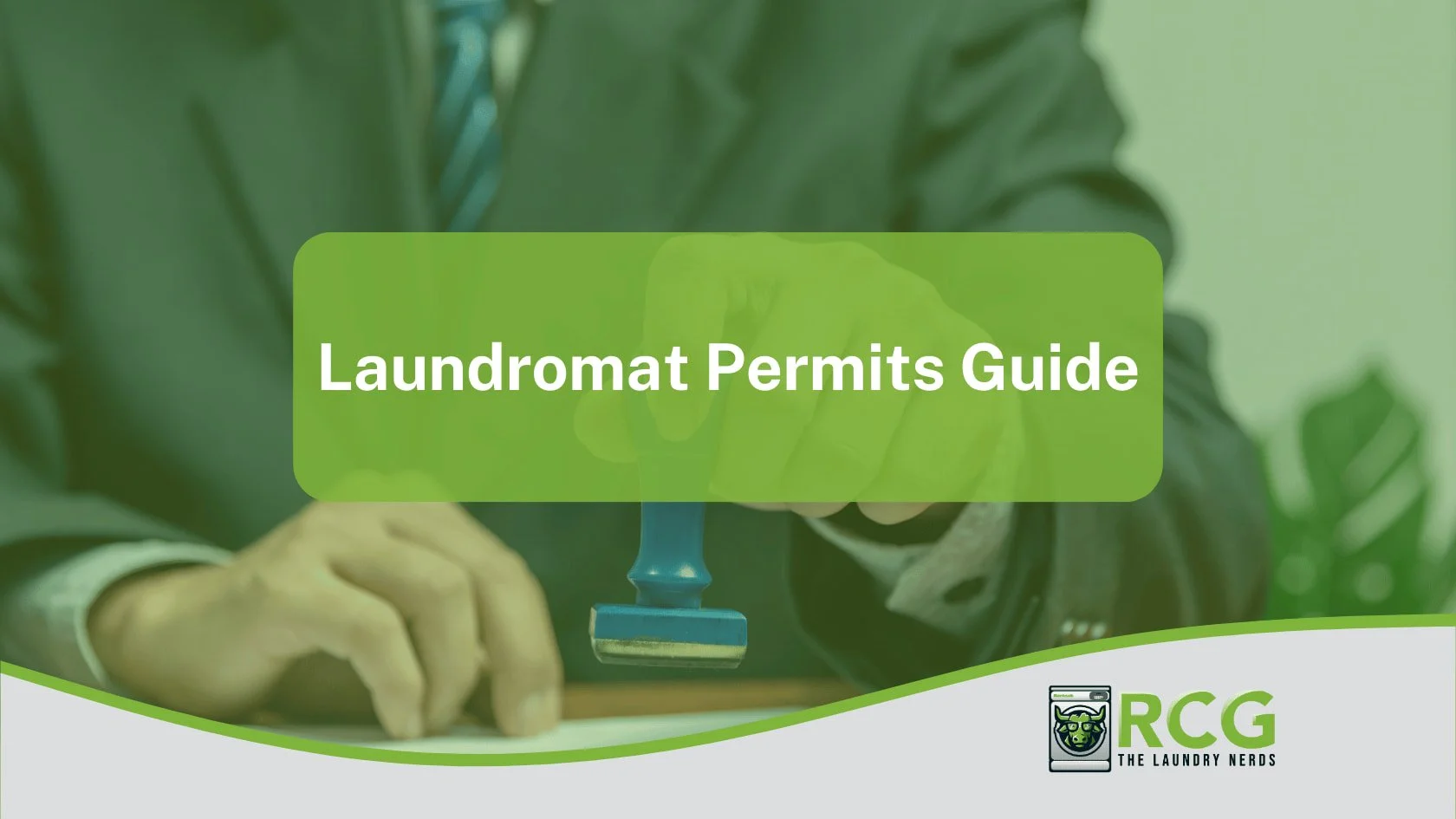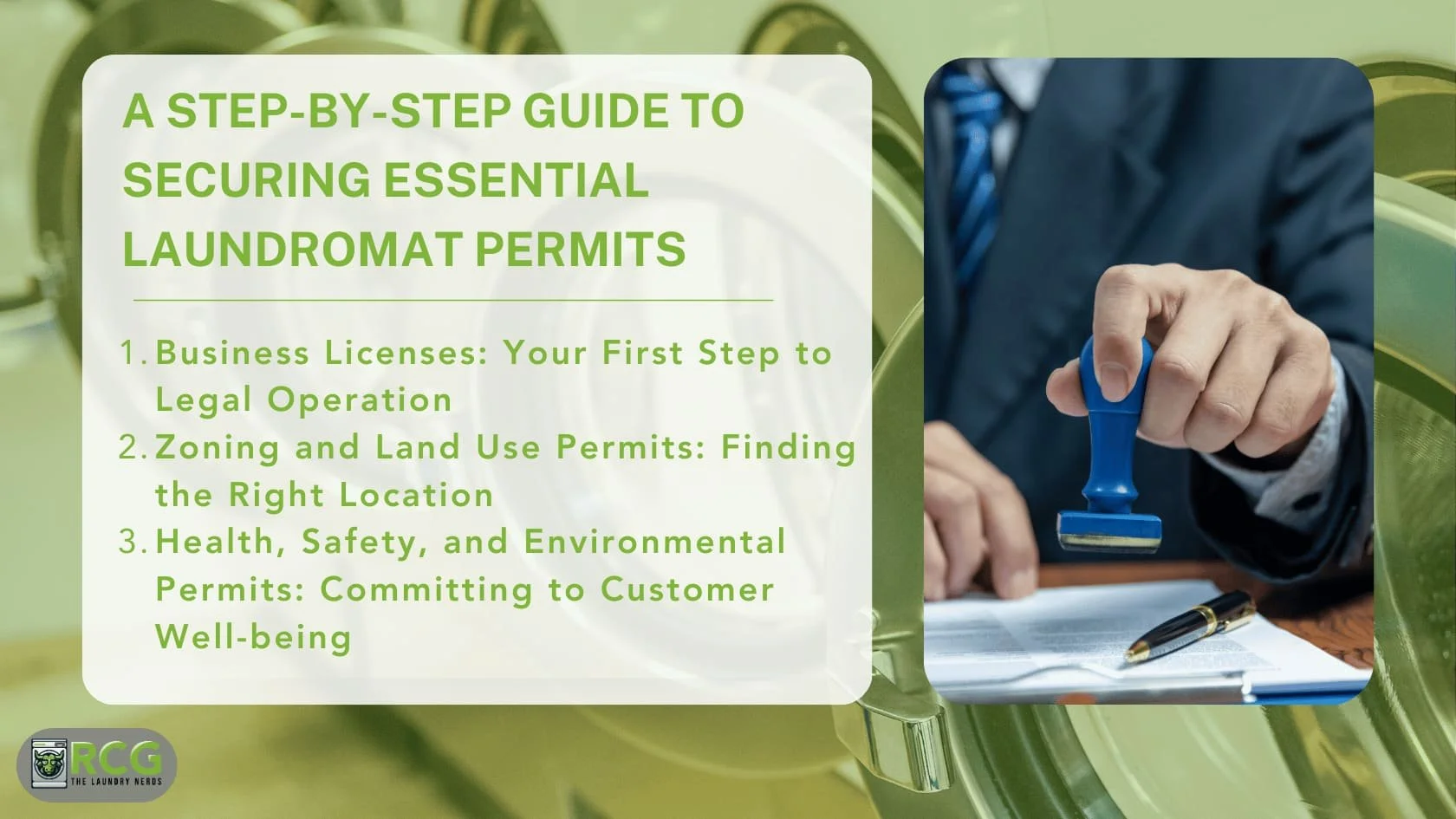Laundromat Permits Guide
Table of Contents
Anyone wondering how to open a laundromat business must understand the permit process. It's the first step in turning a business idea into a legitimate operation. From business licenses to zoning permits, each document plays a vital role in establishing your laundromat as a compliant and trustworthy establishment.
The permit acquisition process might seem daunting at first, but it's manageable with the proper guidance. This guide will walk you through the essential permits you'll need, how to obtain them, and why they're necessary for your business's success. We'll cover everything from the initial business license application to ongoing compliance requirements, giving you the knowledge and confidence to tackle this crucial aspect of starting a laundromat business.
Remember, there are approximately 35,000 laundromats in the United States alone, each of which had to go through this permit process. By understanding and successfully navigating this phase, you're not just fulfilling legal requirements—you're laying the groundwork for a thriving business that could potentially generate annual revenues between $200,000 and $500,000 in the U.S. and Europe.
Whether you're looking to own a laundromat or simply curious about what permits you need to open a laundromat, this guide will provide you with the essential information to get your business off to a clean start.
If you’re ready to launch your laundromat, partner with Real Clean Group for comprehensive support and expertise. Let us help you navigate the permit process and set your business up for success!
“Investing a laundry business can be a game changer for your financial freedom. With a high success rate and nearly passive income, we can’t recommend the laundry business enough.”
A Step-by-Step Guide to Securing Essential Laundromat Permits
Business Licenses: Your First Step to Legal Operation
One of the most common questions about opening a laundromat is whether you need a license. The answer is a resounding yes. The first permit required to open a laundromat is a business license, which allows operation as a legal business entity. This license is your ticket to legally operating your business and is an essential step in starting a laundromat business.
How to Apply for a Business License for Your Laundromat
Research local requirements: Contact your city or county clerk's office to understand specific laundry license requirements in your area.
Gather necessary documents: Typically, you'll need proof of identity, business structure documents, and a tax ID number.
Complete the application: Fill out the business license application form, which can often be done online.
Pay the fee: Be prepared to pay a licensing fee, which varies by location.
Submit and wait: After submitting your application, allow time for processing. This can take a few days to several weeks.
Remember, a sales tax permit is necessary to legally collect sales tax on the laundromat's products and services. Obtaining this permit is often a separate process from obtaining your general business license.
Tips on Renewing and Maintaining Your Business License
Mark your calendar: Set reminders for renewal dates to avoid lapses in your license.
Stay compliant: Adhere to all local regulations to ensure smooth renewals.
Budget accordingly: The average cost of licenses and permits to operate a laundromat is $2,000 to $5,000 annually, depending on the location.
Keep records: Maintain organized documentation of all permits and licenses for easy reference during renewals.
Zoning and Land Use Permits: Finding the Right Location
Navigating Zoning Laws to Ensure Compliance
Zoning laws play a crucial role in determining where you can operate your laundromat. Here's how to navigate them:
Check zoning maps: Consult your local zoning office for maps indicating where laundromats are permitted.
Understand classifications: Laundromats often fall under commercial or mixed-use zoning.
Apply for a zoning permit: If your chosen location is appropriately zoned, you must apply for a zoning permit to confirm that your laundromat complies with local land use regulations.
Consider parking requirements: Many areas have specific parking regulations for businesses like laundromats.
Strategies for Dealing with Zoning Challenges
Seek variances: If your ideal location isn't zoned for a laundromat, you can apply for a variance or special use permit.
Attend public hearings: Be prepared to present your case at zoning board meetings if necessary.
Engage with the community: Building local support can help overcome zoning hurdles.
Consider alternative locations: Have backup options in case your first choice isn't viable due to zoning issues.
Health, Safety, and Environmental Permits: Committing to Customer Well-being
Procedures for Obtaining Health and Safety Permits
Health and safety permits are essential to ensure the laundromat meets standards for cleanliness, equipment safety, fire prevention, and overall workplace safety. Here's how to obtain them:
Contact local health department: Inquire about specific health permit requirements for laundromats.
Schedule inspections: Arrange for health and safety inspections of your premises.
Implement safety measures: Install required safety equipment like fire extinguishers and first aid kits.
Train employees: Ensure all staff are trained in health and safety procedures.
Display permits: Once obtained, prominently display all health and safety permits in your laundromat.
The Importance of Environmental Permits in Sustainable Operations
Environmental permits may be required, depending on the location, to ensure proper disposal of wastewater and adherence to environmental regulations. Here's why they're crucial:
Wastewater management: Proper permits ensure you're disposing of wastewater correctly, protecting local water systems.
Energy efficiency: Some permits may require energy-efficient equipment, reducing your carbon footprint.
Chemical usage: Environmental permits often regulate the types and amounts of detergents and chemicals you can use.
Utility connections: Laundromats must obtain utility permits to establish connections for water, electricity, and gas to ensure the necessary infrastructure for operation.
By securing these essential permits, you're not just complying with legal requirements—you're laying the foundation for a successful, sustainable, and responsible laundromat business. The process might seem complex, but it's a crucial step in owning a laundromat that thrives in the long run.
Ensuring Continued Compliance: Renewals, Regulations, and Resources
Maintaining compliance with permits and regulations is crucial for the long-term success of your laundromat. While the laundromat success rate can be promising, staying on top of legal requirements is essential to keep your business thriving. Let's explore how to navigate the ongoing process of compliance, renewals, and regulatory changes.
Keeping Up with Renewal Deadlines and Regulation Changes
Staying compliant isn't a one-time task; it's an ongoing responsibility. Here are some strategies to help you stay on track:
Create a compliance calendar: Mark all renewal deadlines for your various permits and licenses. Set reminders well in advance to avoid last-minute rushes.
Subscribe to local government newsletters: Many municipalities offer email updates about changes in business regulations. Sign up to stay informed.
Conduct regular internal audits: Periodically review your operations to ensure they align with current regulations. This proactive approach can help you identify and address issues before they become problems.
Attend industry seminars and workshops: These events often cover regulatory updates and can be valuable sources of information.
Implement a digital compliance management system: Consider using software designed to track permit renewals and regulatory requirements.
Remember, staying ahead of renewals and changes keeps your business legal and contributes to a higher laundromat success rate by avoiding costly fines or operational disruptions.
Leveraging Local Resources and Authorities for Support
Local resources can be invaluable in navigating the complex world of business compliance. Here's how to make the most of them:
Build relationships with local officials: Establish connections with your local health department, zoning office, and business licensing department. These relationships can be helpful when you need clarification or assistance.
Join local business associations: Many cities have small business associations or chambers of commerce that offer support and resources for regulatory compliance.
Utilize Small Business Development Centers (SBDCs): These centers often provide free or low-cost assistance with regulatory compliance and other business matters.
Consult with local legal experts: Consider developing a relationship with a local attorney who specializes in business law. They can provide valuable insights into complex regulatory issues.
Engage with other laundromat owners: Network with other business owners in your industry. They can share experiences and strategies for maintaining compliance.
Addressing Common Challenges in Maintaining Permit Compliance
Even with the best intentions, maintaining permit compliance can present challenges. Here are some common issues and strategies to address them:
Keeping up with changing regulations:
Solution: Set aside time each quarter to review any regulatory changes affecting your industry.
Tip: Consider assigning a team member to be responsible for tracking and reporting on regulatory updates.
Managing multiple permit renewals:
Solution: Use a centralized system to track all permits and their renewal dates.
Tip: Consider staggering renewal dates when possible to spread out the workload.
Budgeting for compliance costs:
Solution: Factor compliance costs into your annual budget, including potential increases.
Tip: Set aside a contingency fund for unexpected compliance-related expenses.
Ensuring employee compliance:
Solution: Develop a comprehensive training program that covers all relevant regulations.
Tip: Regularly update and refresh this training to keep employees informed of any changes.
Dealing with inspections:
Solution: Maintain a state of "always ready" by implementing regular self-inspections.
Tip: Keep detailed records of your compliance efforts to demonstrate due diligence during official inspections.
By proactively addressing these challenges, you can maintain a smooth operation and improve your laundromat's success rate. Remember, compliance isn't just about avoiding penalties; it's about creating a safe, efficient, and trustworthy business that customers will want to return to again and again.
Staying on top of permits and regulations may seem daunting, but it's a crucial part of running a successful laundromat. With careful planning, utilization of available resources, and a proactive approach to compliance, you can navigate these waters with confidence and keep your laundromat business running smoothly for years to come.
Closing Remarks: The Path Forward with Your Laundromat Venture
As we wrap up our comprehensive guide on laundromat permits, it's essential to reflect on the journey ahead. Starting a laundromat business is an exciting venture that can lead to a rewarding and profitable enterprise. However, it's crucial to approach this endeavor with a clear understanding of what lies ahead, including the costs of starting a laundromat and the various steps involved in launching your business.
When considering how much it costs to start a laundromat business, it's essential to factor in not just the permits and licenses we've discussed but also other significant expenses. The cost of starting a laundromat can vary widely depending on factors such as location, size, and equipment quality. Typically, laundromat business start-up costs can range from $200,000 to $500,000 or more. This includes expenses for:
Leasing or purchasing a space
Buying and installing washers and dryers
Renovations and interior design
Utility deposits and initial bills
Marketing and advertising
Initial inventory of supplies
Remember, these costs are in addition to the permits and licenses we've covered in this guide. While the initial investment may seem substantial, many entrepreneurs find that starting a laundromat business can be a lucrative long-term investment.
If you’re ready to take the next step in starting your laundromat business, connect with Real Clean Group today! Our expert team can provide comprehensive support and guidance to help you navigate the startup process smoothly and set your venture up for success. Don’t wait—let us help you turn your vision into reality!






